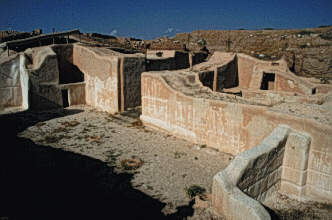 Ancient city excavated at the site of Tell Mardikh on the River Orontes in Syria. Recent excavations have yielded evidence of the previously unknown language and history of a powerful state of the 3rd millennium BC. Although the site was occupied from the 4th millennium BC onwards the period of its greatest wealth and power was in thc mid 3rd millennium; a large royal palace of this period has yielded an archive of more than 15,000 clay tablets inscribed in the cuneiform script in two languages, Sumerian and the local language, a Semitic tongue now labelled Eblaitc. Work is still continuing on the tablets, but they have already revealed a wealth of information about the economy, political organization and religion of Ebla ...
Ancient city excavated at the site of Tell Mardikh on the River Orontes in Syria. Recent excavations have yielded evidence of the previously unknown language and history of a powerful state of the 3rd millennium BC. Although the site was occupied from the 4th millennium BC onwards the period of its greatest wealth and power was in thc mid 3rd millennium; a large royal palace of this period has yielded an archive of more than 15,000 clay tablets inscribed in the cuneiform script in two languages, Sumerian and the local language, a Semitic tongue now labelled Eblaitc. Work is still continuing on the tablets, but they have already revealed a wealth of information about the economy, political organization and religion of Ebla ... The city was clearly an important commercial centre, exporting woollen cloth, wood and furniture to areas as far flung as Ashur in Mesopotamia and Kanesh in Anatolia. The settlement of this period was destroyed, notably by the Akkadian ruler Naram-Sin but the city was rebuilt and a great palace complex and some wealthy burials of the early 2nd millennium BC have been excavated ...
The Ebla texts include many Semitic names which recall those of the Old Testament but extravagant claims of a cult of Yahweh at Ebla and of texts mentioning the biblical patriarchs, the cities of Sodom and Gomorrah and the Flood story are without foundation ...
No comments:
Post a Comment